 W
WThe term Government of Indonesia can have a number of different meanings. At its widest, it can refer collectively to the three traditional branches of government – the Executive branch, Legislative branch and Judicial branch. The term is also used colloquially to mean the Executive and Legislature together, as these are the branches of government responsible for day-to-day governance of the nation and lawmaking. At its narrowest, the term is used to refer to the Executive Branch in form of the Cabinet of Indonesia as this is the branches of government responsible for day-to-day governance.
 W
WThe 2020 Indonesian census was the 7th census in Indonesia. It was held in September 2020 by Statistics Indonesia. The resident Indonesia population was projected to be 269.6 million, a 13.4% increase from the 2010 census.
 W
WThe Attorney General of the Republic of Indonesia is the competent authority to advise the Government of Indonesia on matters of law. The Attorney General represents the government at the Supreme Court of Indonesia and is a Cabinet-level official. The office is not part of the Justice Department, however, as the cabinet has its own Law and Human Rights department with a separate Minister of Law and Human Rights that focuses on more technical matters and regulation making rather than executing the Supreme Court's order.
 W
WThe Cabinet of the Republic of Indonesia is part of the executive branch of the Indonesian government. It is composed of the most senior appointed officers of the executive branch of the government serving under the president. Members of the Cabinet serve at the pleasure of the president, who can dismiss them at will for no cause.
 W
WThe capital of the Republic of Indonesia is Jakarta, as set according to Act Number 10 of 1964. Located on the island of Java, Jakarta was formerly called Batavia during the Dutch colonial period. In the early 20th century, the Dutch East Indies government attempted to relocate the capital from Batavia to Bandung. During Indonesia's struggle for independence, the Indonesian government moved the capital to Yogyakarta and then to Bukittinggi, where it remained for a short time until the restoration of control to Jakarta.
 W
WA Republic of Indonesia Certificate of Citizenship was an identity card establishing citizenship in the Republic of Indonesia.
 W
WThe Constitutional Court of the Republic of Indonesia is a court in Indonesia which is part of Judicial branch of Government of Indonesia. Its primary role is the reviewing of constitutionality under the Constitution. It also has administrative law functions such as ruling on competence disputes between governmental entities, giving final decisions on impeachments, and making judgments on the dissolution of political parties.
 W
WCoordinating Ministry for Economic Affairs is the Indonesian government ministry in charge of planning and policy co-ordination, as well as synchronisation of policies in the fields of economics. The ministry is led by a Coordinating Minister for Economics Affairs, who is Airlangga Hartarto since 23 October 2019.
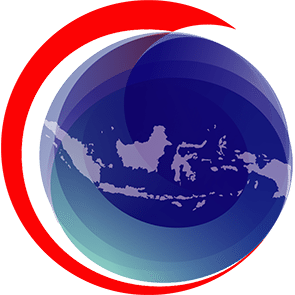 W
WCoordinating Ministry for Maritime and Investment Affairs is the Indonesian government ministry in charge of planning, coordinating as well as synchronizing policies in maritime affairs. The Coordinating Minister for Maritime and Investment Affairs is Luhut Binsar Pandjaitan.
 W
WThe Immigration Polytechnic is an Indonesian government service academy under the aegis of the Ministry of Law and Human Rights. Founded in 1962 and re-founded in 2000, the Polytechnic trains individuals to work in government employment in the field of immigration, whether to be stationed at immigration offices Indonesia-wide or at immigration units at Indonesian overseas missions.
 W
WThe Indonesia 2010 census was conducted by Statistics Indonesia in May 2010.
 W
WMeteorology, Climatology, and Geophysical Agency is an Indonesian non-departmental government agency for meteorology, climatology, and geophysics.
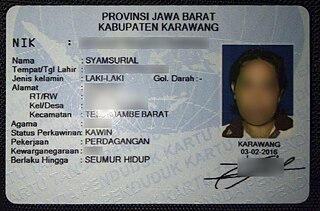 W
WThe Indonesian identity card, known in Indonesian as the Kartu Tanda Penduduk or KTP, is an identity card issued in Indonesia. Separate versions exist for Indonesian citizens and non-Indonesian residents. The card is issued upon reaching the age of 17 or upon marriage. For Indonesian citizens, the card is valid for life. For non-Indonesian citizens, the card's expiry date is the same as that of their residency permit. Since 2011, the Indonesian government has issued an electronic version of the card, known as the e-KTP, which contains an embedded microchip.
 W
WThe National Agency for Disaster Countermeasure, abbreviated as BNPB, is the Indonesian board for natural disaster affairs. It was established in 2008 to replace the National Disaster Management Coordinating Board. BNPB is directly responsible to the President of Indonesia and the chairman is directly appointed by the President.
 W
WThe Jakarta Tourism and Culture Office (JTCO) (Indonesian: Dinas Pariwisata dan Kebudayaan DKI Jakarta is one of the Department of Government of Jakarta. The Jakarta Tourism and Culture Office is responsible for culture and tourism affairs in Jakarta.
 W
WThe Judicial Commission of Indonesia was established as a consequence of the third amendment to the Constitution of Indonesia ratified by the Indonesian People's Consultative Assembly on 9 November 2001. The Commission's duty is to monitor the performance of judges, advise the House of Representatives on judicial appointments and review community complaints about the behavior and fairness of presiding judges.
 W
WThis is a list of central government agencies in Indonesia.
 W
WThis article lists persons and politicians who have been appointed as the Deputy Minister of Finance in Indonesia.
 W
WThe following is a list of deputy speakers of the People's Consultative Assembly in Indonesia.
 W
WThe Ministry of National Development Planning or National Development Planning Agency is a ministry of the Republic of Indonesia that has the task to oversee government affairs in the field of national development planning to assist the President in organizing state government. The minister is responsible to the President. The Ministry of National Development Planning uses organizational units and resources within the National Development Planning Agency.
 W
WThe Ministry of Public Works and Housing, abbreviated Kemen PUPR, is a ministry of the Government of Republic of Indonesia that is responsible for public works and public housing.
 W
WThe National Counter Terrorism Agency is an Indonesian non-ministerial government department that works to prevent terrorism. BNPT is headed by a chief, Suhardi Alius, who is responsible to the President. When it was first launched, the leader of BNPT held the ranking of a civil servant but the Presidential Regulation in 2012 elevated the post of BNPT Chief to the ministerial level.
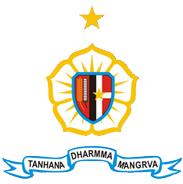 W
WNational Resilience Institute (Indonesian: Lembaga Ketahanan Nasional, Lemhannas) is an Indonesian Non-Ministerial Government Institution tasked with carrying out government duties in the field of education for national leaders, strategic assessment of national resilience and strengthening of national values.
 W
WPancasila is the official, foundational philosophical theory of Indonesia. Pancasila comprises two Old Javanese words originally derived from Sanskrit: "pañca" ("five") and "sīla" ("principles"). Thus it is composed of five principles and contends that they are inseparable and interrelated:
 W
WThe People's Consultative Assembly of the Republic of Indonesia is the legislative branch in Indonesia's political system. It is composed of the members of the People's Representative Council (DPR) and the Regional Representative Council (DPD). Before 2004, and the amendments to the 1945 Constitution, the MPR was the highest governing body in Indonesia.
 W
WThe People's Representative Council of the United States of Indonesia was one of the two national legislative assemblies in the United States of Indonesia (RUSI). The council was formed after the establishment of the Indonesian federal state. It consisted of 150 members.
 W
WThe politics of Indonesia take place in the framework of a presidential representative democratic republic whereby the President of Indonesia is both head of state and head of government and of a multi-party system. Executive power is exercised by the government. Legislative power is vested in both the government and the bicameral People's Consultative Assembly. The judiciary is independent of the executive and the legislature.
 W
WThe president of the Republic of Indonesia is the head of state and also head of government of the Republic of Indonesia. The president leads the executive branch of the Indonesian government and is the commander-in-chief of the Indonesian National Armed Forces. Since 2004, the president and vice president are directly elected to a five-year term, once renewable, allowing for a maximum of 10 years in office.
 W
WThe Executive Office of the President of the Republic of Indonesia is a non-structural government agency directly under the auspices of the President of Indonesia. The office reports to the President and is headed by a Chief of Staff. Previously, the office was named Unit of Presidential Staff based on the Presidential Decree No.29/ 2014. The current name has been used based on the "Presidential Decree No.26/2015" dated 23 February 2015 due to the expansion of the task and function assigned to the office.
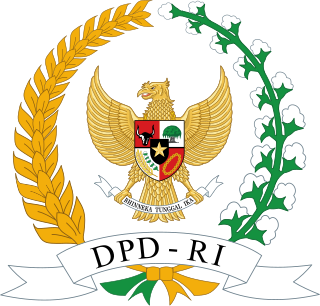 W
WThe Regional Representative Council, is one of two parliamentary chambers in Indonesia. Together with the Dewan Perwakilan Rakyat, (DPR), it makes up the Indonesian national legislative body, the Majelis Permusyawaratan Rakyat (MPR). Under Indonesia's constitution, the authority of the DPD is limited to areas related to regional governments and can only propose and give advise on bills to the DPR. Unlike the DPR, the DPD has no direct law-making power. Its members are usually called senators instead of DPD members.
 W
WThe Senate of the United States of Indonesia was the upper chamber of the Parliament of the United States of Indonesia which, along with the People's Representative Council of the United States of Indonesia—the lower chamber—comprised the legislature of the United States of Indonesia.
 W
WStatistics Indonesia, locally known as BPS, is a non-departmental government institute of Indonesia that is responsible for conducting statistical surveys. Its main customer is the government, but statistical data is also available to the public. Annual surveys include national and provincial socio-economics, manufacturing establishments, population and the labour force.
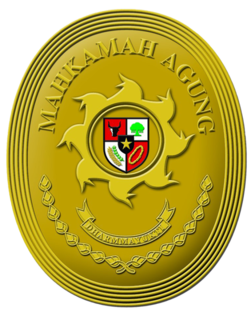 W
WThe Supreme Court of the Republic of Indonesia is the independent judicial arm of the state. It maintains a system of courts and sits above the other courts and is the final court of appeal. It can also re-examine cases if new evidence emerges.
 W
WThe vice president of the Republic of Indonesia is second-highest officer in the executive branch of the Indonesian government, after the president, and ranks first in the presidential line of succession. Since 2004, the president and vice president are directly elected to a five-year term.
 W
WVice Presidential Edict No. X was an edict issued by Indonesian Vice-president Mohammad Hatta on 16 October 1945 which gave the Central Indonesian National Committee (KNIP), initially a purely advisory body, the authority to become the legislative body of the government.
 W
WWater privatisation in Jakarta began when the British water company Thames Water entered into an agreement with the son of then-President Suharto in 1993 to obtain a water concession. Under the influence of the French water company Suez, however, the government decided to split the city's service area between the two companies. The government awarded Thames Water and Suez each a concession for one half of the city without competitive bidding. The contracts foresaw water charge increases that would allow the companies to earn a comfortable 22 percent rate of return. However, only two months after the contracts were signed, the Indonesian rupiah massively lost in value due to the East Asian financial crisis, and President Suharto was toppled. The concessions survived, but the government imposed a tariff freeze and the contracts had to be renegotiated to reduce their targets. In 2006 Suez sold half and Thames Water all its shares to Indonesian investors.